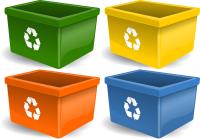 Add My Company
Add My Company
Sign In

As Walsall Council recently revealed that in the last six months alone homeowners putting rubbish in the wrong bins has cost them over £200,000, it’s clear that something needs to change.
But how can so many people have no clue what they should be recycling? Jonathan Oldfield, Riverside Waste Machinery’s managing director, takes a closer look at the issue…
Recycling is nothing new. In fact, over the last few years it’s been brought to our attention on an even greater level. In 2018, David Attenborough and his Blue Planet series generated a surge of interest in plastic pollution, and the devastating effect this was having on our oceans. And Swedish environmental activist Greta Thunberg has since gained international recognition for her no-nonsense approach to climate change, and how the earth and its resources are in danger.
So, with this in mind – and as the cost of once ‘throwaway’ plastic bags in supermarkets continues to rise and the use of straws in establishments dwindles – why is it that the general public don’t understand their recycling obligations?
Is it, in reality, that the whole practice is just too complicated?
Many feel that packaging labels are to blame. Nowadays, consumers are faced with a range of, sometimes baffling, recycling symbols, causing all sorts of confusion regarding whether the item in question can go in the recycling bin. And depending on the area you live in, certain materials will be recyclable, while others won’t.
To be ‘on the safe side’, many households will take the risk and pop the article in question into the recycling, presuming that it will be removed at the plant if necessary. But this is a real issue, as plastic contamination, for instance, can result in entire loads of packaging being incinerated or sent to landfill – which goes against the point of the whole process to begin with.
However, according to several councils, some of the main culprits causing contamination are black bin bags, clothing and other textiles, dirty nappies, and shoes. These are, without a doubt, items that cannot be recycled, so the authorities are also having to battle with pure laziness in certain cases.
Without a national strategy for recycling, the differences in processes across the UK will unfortunately, continue.
The upshot of this is that our recycling rates have not seen any significant increase in the last decade. In fact, having plateaued at around 45% for the past few years, we look set to miss our target of 50% of materials being recycled by the end of 2020, which is a real shame.
The need to make the current recycling information on packaging more streamlined is evident, if we are to make progress in this area.
Something needs to change, or even the most willing recyclers among us are going to continue getting it wrong – through no fault of their own.
For more information on Why are so many people getting recycling wrong? talk to Riverside Waste Machinery Ltd
Enquire Now
List your company on FindTheNeedle.
